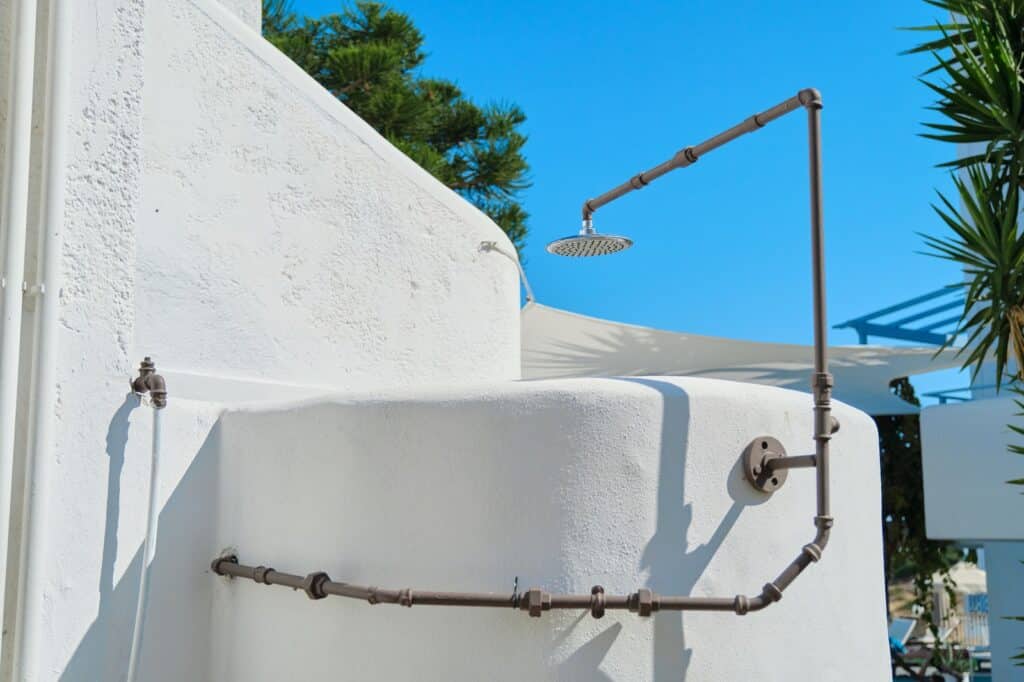A natural stone shower is a luxurious addition to any bathroom. It not only elevates the aesthetics of your space but also adds long-term value to your home. However, keeping a stone shower looking pristine requires proper care and maintenance. If you’ve recently installed a stone shower or are considering adding one, understanding the best cleaning practices will help you maintain its beauty and longevity.

With the right approach, cleaning a natural stone shower doesn’t have to be a hassle. Let’s break down the best ways to keep your stone shower spotless, avoid damage, and ensure it lasts for years to come.
Choosing the Right Natural Stone for Your Shower
Not all stone is created equal, especially when it comes to showers. Since showers are constantly exposed to moisture, soap, and other residue, choosing the right type of stone is critical. Some stones are more porous than others and may require extra maintenance to prevent staining and water damage.
Best Stones for Showers
- Granite – One of the most durable options for showers, granite is naturally resistant to moisture, scratches, and stains. It also stands up well to bath and body products.
- Slate – A popular choice for its rustic appearance, slate is a hard, moisture-resistant stone. However, certain types of slate may break down over time in wet environments, so choosing high-quality slate is essential.
- Travertine – A type of limestone, travertine offers a warm, classic look. While slightly more porous than granite or slate, it can work well in showers if properly sealed and maintained.
- Marble – Marble’s luxurious veining makes it a favorite for high-end showers, but it is one of the softer and more porous stones. Light-colored marble, in particular, may discolor or rust over time due to its iron content.
How to Properly Clean a Stone Shower
Regardless of the type of stone you have, it’s crucial to use non-acidic, non-abrasive cleaners. Common household cleaners such as vinegar, lemon juice, and bleach can erode natural stone surfaces, causing dull spots or permanent damage.
When selecting a cleaner, always choose one that is formulated for natural stone. If you’re unsure, test the cleaner on a small, hidden area before applying it to the entire shower.
Daily Cleaning Routine
- Use a Squeegee – Removing excess water after each shower helps prevent soap scum, hard water buildup, and mildew. This simple step reduces the need for deep cleaning.
- Wipe Down with a Microfiber Cloth – A quick wipe with a soft cloth prevents mineral deposits and keeps the stone looking fresh.
- Ventilate the Bathroom – Proper airflow helps dry the shower faster, reducing mold and mildew growth. Use an exhaust fan or leave the bathroom door open after showering.
Weekly Deep Cleaning
Once a week, clean your stone shower using a stone-safe cleaner and a soft microfiber cloth or non-abrasive sponge. Avoid rough scrub brushes or steel wool, which can scratch the stone.
Cleaning Process:
- Spray a Stone-Safe Cleaner – Apply a natural stone cleaner and let it sit for 5-10 minutes to break down soap scum and grime.
- Gently Wipe the Surface – Use a microfiber cloth to wipe down the stone, paying extra attention to high-contact areas.
- Rinse Thoroughly – Use warm water to remove any remaining cleaner and debris.
- Dry with a Soft Cloth – Drying the surface helps prevent water spots and mineral buildup.
How to Clean Different Types of Stone Showers
Granite Showers
- Wipe down daily to remove excess water and prevent buildup.
- Once a week, use a granite-safe cleaner to deep clean.
- Use a soft nylon brush to gently scrub grout lines.
- Seal the granite every 6-12 months to maintain its resistance to moisture.
Slate Showers
- Because some types of slate are more porous, always remove standing water after showering.
- Use a pH-neutral stone cleaner once a week.
- For stains, apply a paste of baking soda and water, let it sit for 10 minutes, then wipe clean.
- Seal slate every 6-12 months to prevent water penetration.
Travertine Showers
- Remove water buildup daily with a squeegee.
- Deep clean weekly with a travertine-specific cleaner.
- Gently buff with a microfiber cloth to maintain its natural sheen.
- Never use acidic cleaners, as travertine is highly sensitive to them.
Marble Showers
- Since marble is prone to staining, wipe up spills and splashes immediately.
- Use a marble-safe cleaner once a week.
- Rinse with clean water after applying any cleaner.
- Avoid abrasive scrubbers, as marble scratches easily.
- Reseal marble every 3-6 months to protect against water damage and stains.
How to Remove Hard Water Stains and Soap Scum
Over time, hard water deposits and soap residue can dull the look of your stone shower. Here’s how to tackle them safely:
- For Hard Water Stains – Mix equal parts water and isopropyl alcohol, spray on the surface, and let sit for a few minutes. Wipe clean with a soft cloth.
- For Soap Scum – Use a mixture of warm water and mild dish soap to break down soap residue without damaging the stone.
- For Mold and Mildew – A solution of hydrogen peroxide and water (50/50 mix) can kill mildew without harming the stone.
Preventing Long-Term Damage to Your Stone Shower
Seal the Stone Regularly – Sealing prevents moisture from penetrating the stone and causing discoloration. Different stones require different sealing schedules:
- Granite: Once a year
- Slate & Travertine: Every 6-12 months
- Marble: Every 3-6 months
Use a Shower Mat or Rug – Placing a bath mat outside the shower minimizes water exposure to surrounding floors.
Avoid Harsh Chemicals – Stick to pH-neutral cleaners designed for natural stone.
Fix Leaks Immediately – Even a small leak can cause water to seep into porous stone, leading to stains or deterioration over time.
Caring for a stone shower takes a little extra effort, but the payoff is a beautiful, long-lasting bathroom feature that adds value to your home. By using gentle cleaning techniques, sealing regularly, and wiping down the shower after each use, you can keep your stone shower looking as stunning as the day it was installed.
If you’re thinking about installing a stone shower or need expert advice on maintaining your existing one, Wholesale Granite Direct is here to help. We provide high-quality natural stone and professional installation services in Arlington, TX, and Granbury, TX. Call us today at 817-962-2616 (Arlington) or 817-710-8604 (Granbury) for expert guidance on stone showers!

